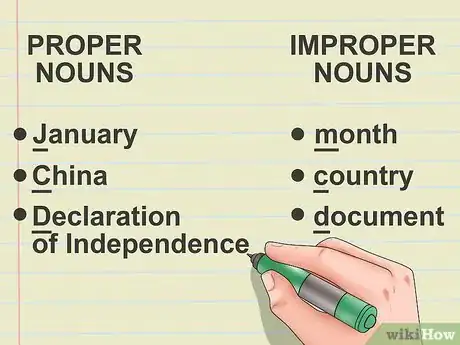This article was co-authored by Michelle Golden, PhD. Michelle Golden is an English teacher in Athens, Georgia. She received her MA in Language Arts Teacher Education in 2008 and received her PhD in English from Georgia State University in 2015.
There are 12 references cited in this article, which can be found at the bottom of the page.
This article has been viewed 69,794 times.
Capitalization is one of the most basic and important elements of writing. Capitalization draws the reader’s attention to names, titles, and more. Capitalization also marks the start of new sentences and new paragraphs, provides signals to the reader, and helps to create a structure and a hierarchy in written language. For these reasons, capitalization is essential for readers and writers. The rules may seem complex, but most uses of capital words fall under just a few big-picture categories. Once you understand these categories, your writing will be clearer and easier to follow.
Steps
Learning Basic Capitalization Rules
-
1Capitalize proper nouns. Proper nouns are unique items and they will always begin with a capital letter. More specifically, proper nouns name specific people, places, and things. Capitalizing proper nouns helps readers identify specific and important items in a sentence or paragraph. Consider:
- Some examples of proper nouns are January, China, and Declaration of Independence.
- Words like month, country, and document are not proper nouns because they do not name specific nouns.
- Also remember days, months, and holidays, such as Tuesday, August, and Halloween.
- Other proper nouns include the names of people, such as John, Dad, or Kate Brown.
- Finally, proper nouns also include the names of buildings, landmarks, and companies, such as the Leaning Tower of Pisa, the Statue of Liberty, or Verizon.[1]
-
2Use capitalization with proper adjectives. Proper adjectives are used when a proper noun is employed as an adjective. Proper adjectives, like proper nouns, name a specific adjective and should be capitalized. This is an important and sometimes neglected rule of capitalization, and you should be careful when writing and capitalizing proper adjectives. For example:
- Countries can be turned into proper adjectives by adding "n" or "ian." For example: America to American, Italy to Italian, or Germany to German. Some exceptions include England, Japan, and France. Their proper adjectives are English, Japanese, and French. Some examples include: Isn't that South American music amazing? My brother got me some Mexican food at the restaurant.
- Also remember that prefixes attached to a proper adjective should not be capitalized, such as "pro-Communist" or "anti-American." However, when a prefix is created from a proper noun, such as "Afro" (which is created from Africa), it should be capitalized such as when you write "Afro-American."[2]
Advertisement -
3Capitalize titles of works. You should always use capitalization when writing the titles of works. This includes books, movies, poems, short stories, and songs. This is because the title is unique and specific and capitalization will signal that the words of the title should stand out to the reader. Rules for capitalizing titles include:[3]
- Capitalize verbs (run, write, etc.), adverbs (silently, swiftly, etc.), adjectives (pretty, thin, etc.), pronouns (he, they, etc.), subordinating conjunctions (as, because, etc.), and nouns (dog, car, etc.) in works.
- Always use a capital letter for the first and last word in a title, even if the first word is one you would not normally capitalize, such as a preposition (to, in, at, etc.), coordinating conjunction (and, but, etc.), or an article (the, a, etc.) words like the, an, a, an, to, in, and other small words.
- Do not capitalize prepositions, coordinating conjunctions, and articles if they show up after the first word or before the last word in a title. For example, it should be “East of Eden” rather than “East Of Eden.”
-
4Use a capital at the beginning of a sentence. The first word of every sentence should be capitalized, regardless of what kind of word. This is because a capital at the start of a sentence signals to a reader that something important is happening. A capital here serves as a road sign for reading. Without capitalizing the first word of every sentence, it would be much harder to discern when a new sentence began and when new ideas were introduced.
- Also remember to capitalize the first word of every line of poetry.
-
5Capitalize the first word of a full sentence in a quotation. You also need to capitalize the first word of sentences in quotes. Since the person is saying something, it's a new sentence and should have a capital letter for the first letter. For example:
- Emily asked, "Do you know where it is?"
- He said to me, "I'd rather have pizza."
- Sally asked me how I was doing and I responded, "I am very well, thank you."
-
6Use capitalization when referring to a period or an event. Any major event or a period in time that is notable should be capitalized. This is because as a major event or period, you should want to draw attention to it as a subject when writing about it. In this usage, capitalizing signals to the reader that they should take note of this event or period as it might be significant in the text or outside of it. For example:
- The Antebellum Period.
- The Victorian Era.
- The Great Recession.
- The Treaty of Paris.
- A notable exception to this is when we write the name of a century. When you refer to the “fourteenth century,” it should not be capitalized, as it is not specific enough. A more specific usage, though, like the “Long Eighteenth Century” (which refers to a period of revolutions and political change from 1688 to 1812) can be capitalized.[4]
Capitalizing When Writing About People
-
1Employ capitalization with the pronoun “I.” One of the most notable words to make sure to capitalize is the pronoun “I.” I refers to oneself, and is as a result, a unique and a specific usage of a word. In addition, it is an important and notable usage in that the user of the word “I” will always see significance in the word.
-
2Capitalize people’s names. One of the major conventions of writing today is to capitalize people’s names. Capitalizing people’s names signals that the name is unique and specific and has importance. By capitalizing a person’s name, we draw the attention of a reader to that person and as a result make them a major subject of the writing. In addition:
- Capitalize the names of pets.
- Capitalize the names of well-known animals.
- Capitalize the names of gods and deities (for example: Lord Ganesha, Zeus, Jesus Christ, or Yahweh), unless you refer to “god” in a general or nonspecific way. If you are referring to your own specific god or deity, you should write "God."[5] [6]
-
3Capitalize family relationships. Family relationships, when you are referring to your own relative, should also be capitalized. For example:
- When you are referring to your relative, such as your “Aunt” or “Mother,” the word should be capitalized, such as “Aunt Margaret" or "Cousin John."
- Incorrect usage would be “aunt Margaret” or "cousin John."
- Incorrect usage would also be to capitalize the relationship of someone else's family member, such as "John's Dad." Instead, it should be "John's dad."
- Also remember not to capitalize your own relationship if it is changed by a modifier like "my." For example, "my dad" is correct, rather than "My Dad."[7]
-
4Remember to capitalize people’s titles. The titles of people should also be capitalized. This is because titles convey prestige and something unique and different. Without capitalizing them, the importance and prestige of the title would not be as apparent to us. Common titles are Jr. Mr. Ms. Miss, Sr., and Dr. [8]
-
5Capitalize names for members of a group. In addition to capitalizing people’s names and titles, you should also capitalize the name for members of a specific group. Capitalizing the name for a group or a member of a group denotes that the group is unique and specific and different from others who do not share membership, identity, of affiliation. Such groups include:
- Racial, ethnic, and nation groups. For example: African Americans, Hispanics, or Italians.
- Political groups. For example: Democrats and Republicans.
- Social groups. For example: Daughters of the American Revolution or Sons of the Confederacy.
- Athletic groups. For example: Yankees or Marlins.[9]
Capitalizing in Other Situations
-
1Identify when to capitalize directions. The cardinal directions and intercardinal directions (like southwest, northwest, etc.) should not be capitalized. This is because the directions are not specific and unique enough and are used fairly commonly in ordinary language and writing. However, consider the following:
- Capitalizing the names of regions like the “South” or the “West” is appropriate, although some scholars do argue if it is necessary.
- Differentiate between using a cardinal direction and the name of a region. For instance, “I’m driving west to Seattle from Chicago.” West, here, signals the direction you are driving, not the name of the region. If you mean to name the region, then capitalize. Make sure to be deliberate in your use.
- Some scholars debate whether a descriptor of people who live in a region like “southerner” should be capitalized. Writing “southerner” and “Southerner” can both be permissible.[10]
-
2Use lowercase for job titles. In most cases, job titles should not be capitalized. This is because those titles are not specific and unique enough to merit capitalization. Consider:
- An example of an incorrect capitalization of a job title is when someone would write “I am a Regional Manager for Alpha Beta Video.”
- Always use lowercase for job titles unless the title is before your name. For example, “Professor Richard Hofstadter.”
- Avoid using capitalization to give importance to something, like your job title, when the rules and conventions of writing do not sanction capitalization.[11] [12]
-
3Capitalize seasons only in certain situations. The seasons of the year should not normally be capitalized. This is because they do not indicate something unique and specific enough to warrant capitalization. However, there are some exceptions to this rule.
- Capitalize seasons when the season is attached to a specific event or title (for example: Spring Beer Fest).
- Capitalize seasons when they refer to something more than just the season. For example, if a season also indicates the semester of a school year, like the “Fall semester,” then capitalize.
- Make sure that capitalization of a season is paired with something more specific.[13]
-
4Learn how to capitalize animal breeds and plant species. Capitalizing animal breeds and plant species can be pretty tricky. This is because breed and species names combine a variety of languages and bring in otherwise complicated issues. Because of this, be very aware when you are writing breed names or plant species. Consider:
- Words that make up plant species are usually lowercase, such as "live oak" or "magnolia tree."
- Whenever a breed or species name incorporates the name of a specific person or geographical location, then you need to capitalize only that portion of the name. For example, "Darwin's fox" or "Labrador retriever."
- Remember to capitalize the names of fruits or vegetables if they refer to specific varieties, such as "Red Delicious apples" or "Better Boy tomato."
- When it comes to binomial nomenclature, which is the Latin language classification system for living things, you should always capitalize the first part, which is the genus name. The second part, which is the species name, is never capitalized (for example, "Canis lupus," the gray wolf). If there is a third part that further specifies, like with "Canis lupus familiaris," (the domestic dog) it should not be capitalized.[14]
Community Q&A
-
QuestionHow should I write the following: Margherita cheese pizza or margherita cheese pizza?
 DonaganTop AnswererMargherita is a type of pizza derived from a proper name, so it should be capitalized. It would also be capitalized If it were considered a brand name.
DonaganTop AnswererMargherita is a type of pizza derived from a proper name, so it should be capitalized. It would also be capitalized If it were considered a brand name. -
QuestionIs 'national landmark' capitalized?
 DonaganTop AnswererNo, that's a common noun, not the name of a specific place or thing.
DonaganTop AnswererNo, that's a common noun, not the name of a specific place or thing. -
QuestionShould I always capitalize the name of a month? For example, should it be "A new series starts in August" or "A new series starts in august"?
 Community AnswerAlways capitalize specific months. August, September, October, etc. should always be capitalized.
Community AnswerAlways capitalize specific months. August, September, October, etc. should always be capitalized.
References
- ↑ http://www.k12reader.com/term/proper-nouns/
- ↑ http://englishplus.com/grammar/00000048.htm
- ↑ http://www.dailywritingtips.com/rules-for-capitalization-in-titles/
- ↑ https://owl.english.purdue.edu/owl/resource/592/1/
- ↑ https://www.ixl.com/ela/grade-2/capitalizing-the-names-of-people-and-pets
- ↑ https://owl.english.purdue.edu/owl/resource/592/1/
- ↑ https://owl.english.purdue.edu/owl/resource/592/1/
- ↑ http://englishplus.com/grammar/00000049.htm
- ↑ https://owl.english.purdue.edu/owl/resource/592/1/
- ↑ http://www.huffingtonpost.com/danny-rubin/7-words-you-need-to-stop_b_6309568.html
- ↑ http://www.huffingtonpost.com/danny-rubin/7-words-you-need-to-stop_b_6309568.html
- ↑ http://www.dailywritingtips.com/avoid-capital-offenses-when-using-job-titles/
- ↑ http://www.quickanddirtytips.com/education/grammar/when-to-capitalize-seasons
- ↑ http://www.dailywritingtips.com/when-to-capitalize-animal-and-plant-names/
- ↑ http://faculty.gvsu.edu/websterm/cummings/caps.htm
- ↑ https://www.class-central.com/report/writing-free-online-courses/











































































